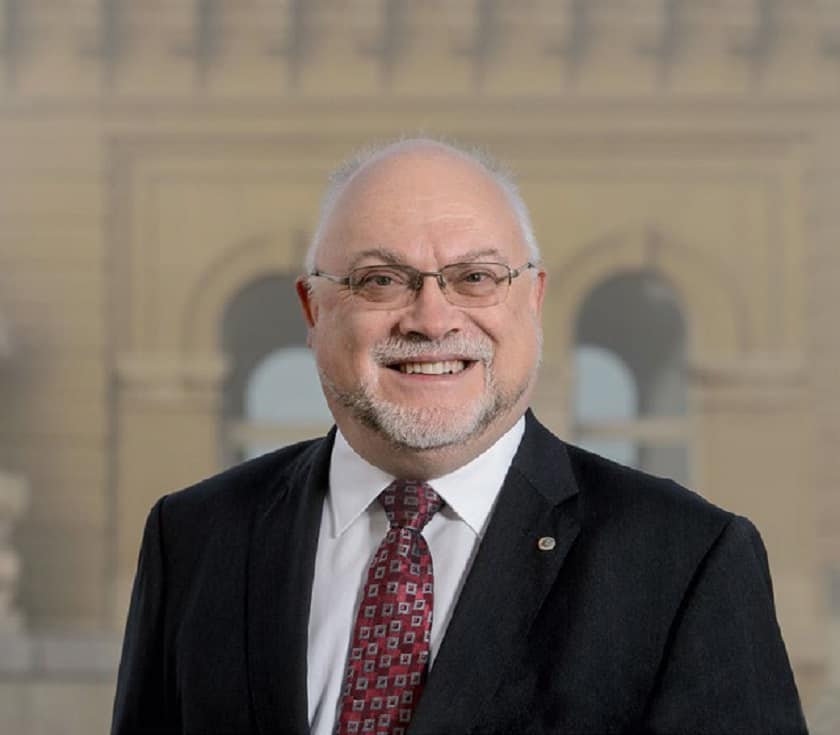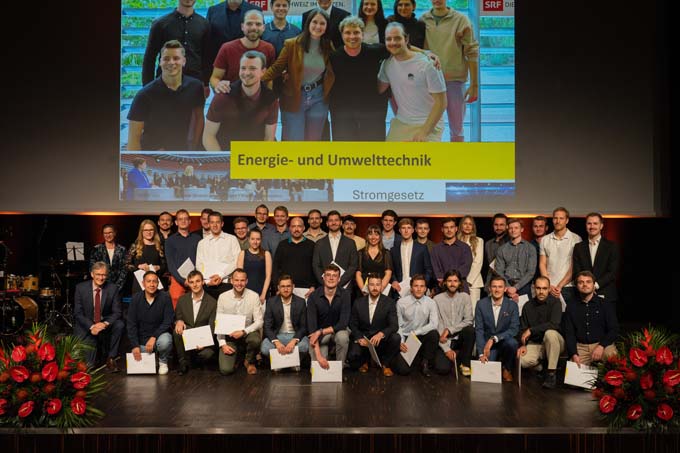"Quality is not something static"
In the following interview, SAQ President Ruedi Lustenberger takes stock of the anniversary year and looks to the future. This will be characterised by an ever faster pace of new developments. But in the eyes of its president, the association is well prepared for this.

Ruedi Lustenberger took over the presidency of the SAQ just under two years ago. Following his retirement from politics - he had been a member of the National Council for the Lucerne CVP since 1999 - he now has more time to devote to his association activities.
Mr. Lustenberger, how did you experience the anniversary year from your own personal perspective?
Ruedi Lustenberger: I was able to experience it as a "young" president - in the sense of "young in office". Together with the managing director and the board of directors, I was able to prepare the events and was ultimately able to see that we were able to develop the various activities over an ideal period of time. I was particularly pleased with all the young people whom we honoured as quality ambassadors on Swiss Quality Day. We were able to send out a good signal with these young professionals who took part in the Swiss Skills Championships.
What happens now with these quality ambassadors?
At a next board meeting we will think about how we can make the benefits of the quality ambassadors even more sustainable. Nothing has been decided yet, but the idea was a good one in any case. Because: At the Swiss Skills - and also at the World Skills - you could see how all these young people embodied and vividly presented Swiss quality, which enjoys a good reputation worldwide. Our dual vocational training system is very close to my heart, and I myself have trained two dozen apprentices in my carpentry workshop. It was a nice gesture on the part of the SAQ to draw on precisely this in its anniversary year. After all, it is our education system that keeps Swiss quality alive and carries it into the future. We also had a worthy anniversary celebration on the occasion of Swiss Quality Day. I was particularly pleased that Federal Councillor Doris Leuthard graced the occasion. After all, it is not a matter of course that a member of the national government simply pays tribute to an association that is celebrating its 50th anniversary.
How satisfied are you with the public's perception of the association? An appearance by a Federal Councillor should indicate a high level of relevance.
If an association like the SAQ has a need to catch up somewhere, then it is in this area - according to the motto: Do good and talk about it. Sure: Our members know the SAQ and appreciate its work. But we are still too little known among the general public. Or to put it another way: all the people who deal with quality on a daily basis do not have the public perception they actually deserve.
As a "young" president, you were able to use the anniversary year to get to know the association from the ground up, whether at the anniversary celebration or at an "association summit" in Zermatt. What were the other highlights for you?
I think this is a good question to ask. Because as President, who has only been in office for one and a half years, I had the opportunity at this summit to get to know our base better. In this context, I like to draw a comparison with many other organizations: After all, the SAQ is structured similarly to the Swiss Confederation. With its sections it is federally organised like Switzerland with its cantons. Federalism is a good model; even more: our system is not only federal, but also subsidiary. This combination of federalism and subsidiarity guarantees success because responsibility and competencies are delegated to the grass roots.
But now one hears again and again about worries about new blood in associations: It is becoming increasingly difficult to find younger board members. What is the SAQ doing in this regard in order to remain well positioned in the future?
At the level of the SAQ umbrella organization, I am not worried about this. Ten years ago we were very fortunate to be able to gain a committed, prudent and strategically thinking managing director in Peter Bieri. The SAQ therefore owes him a great debt of gratitude. There is a continuous renewal of the board. The board is of a manageable size and is staffed with good specialists. I am perhaps the only one who does not have a sound knowledge of quality management.
Does a president even need this?
Above all, a president needs a good network, also politically, and the ability to bundle the various competencies. In any case, I enjoy working with the people on the board. And I'm still confident about that. I am rather concerned that we are always able to recruit younger members in the sections, but not for the board work. This would bring new momentum and new ideas. We will pay more attention to this in the future. Whenever there are vacancies, these should possibly be filled by younger forces. In the case of the president and the presidents of the sections, we have very committed people who have been active for many years. I would like to take this opportunity to thank them for their work.
Quality management is a central content of SAQ's work. I maintain that quality management systems are increasingly standardising "quality", i.e. making it interchangeable. To what extent are unique selling points being put at risk here?
I think this question arises from a different perspective. After all, quality is also constantly evolving; it is not something static, but something living. I can perhaps illustrate this with an example: For a long time, Swiss banks had the reputation of being very reputable. Because of their high quality standards, they enjoyed the trust of an international clientele. This went well until some "accidents" happened. It became clear how this trust could be lost within a short space of time. However, the banks reacted well and quickly - also in response to political pressure - by restoring the credibility of their own people. This was done, among other things, by
The combination of federalism and subsidiarity guarantees success.
not only did they pay attention to good training, but also to continuous further training - and they wanted to have this documented. The industry reacted quickly with the introduction of the certification of client advisors bank, which is carried out by the SAQ according to the ISO standard 17024.
The successful area of personal certification should certainly keep the association busy for some time to come. If we look elsewhere into the future: What are your visions as SAQ President?
We want to continue to develop and maintain our leading position in the fields in which we currently operate successfully. In fact, we see further growth potential in personal certification. Furthermore, we want to gain more space in the public perception. However, we definitely want to retain the militia system, building on the federal and subsidiary system. The quality of a product is largely dependent on the quality of the people who make and sell it. The dual vocational training system is a decisive factor here. This is where we see the opportunity for the Swiss economy to hold its own in international competition. This depends largely on how we can maintain the quality of the people at a high level. This is a challenge, especially when we consider the demographic development and, in general, the fast pace of life. It is not the development itself that is a cause for concern, but the pace of it. In order for people to be able to keep up with this pace, permanent further training is needed - regardless of whether someone has completed a vocational apprenticeship or a university degree. That's where the SAQ can make its contribution. My vision is that we ourselves can keep up with this rapid development or help people to keep up.
Ideally, we should always be one step ahead of developments. Particularly with politics, one sometimes has the impression that it is more and more only reacting instead of acting.
In certain areas, this is probably systemic. In a system like Swiss democracy, politics often has the role of the fire brigade. Otherwise, we would run the risk of wanting to intervene too much in advance in a liberal economy. However, it is important for the fire brigade to be able to locate and extinguish the fire as quickly as possible. I interpret the role of politics as follows: it has a tendency to over-regulate; when it extinguishes a fire, it sometimes wants to do things almost too well and afterwards installs almost too many fire protection measures. These then hamper the economy and involve a lot of administrative work.
Now, certifications are also associated with administrative processes. So the SAQ does benefit directly or indirectly from such efforts.
You see that correctly. But with a decisive difference to the administrative burden imposed by the public authorities. That is something that everyone has to do. For our certifications, this effort is voluntary. Those companies that accept it can hope to gain a competitive advantage that far outweighs the administrative burden.
Let me come back to the speed of developments. The various associations that exist are also affected by this. To what extent are they overburdened by this fast pace? Or are they even in a position to set the pace themselves?
An association legitimizes itself solely through its members or customers, who want to use its services and participate. If an association or organization cannot meet this requirement, then sooner or later it will die away. From this absolute optic, one is challenged oneself and it is therefore important to go and pick up the needs of the customers. The SAQ will be conducting a survey among its members next year, asking self-critical questions. This is the only way to get answers to what could have been done better in the past. And above all, you will get answers to what will be in demand in the market in the future.









